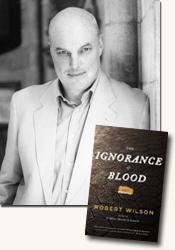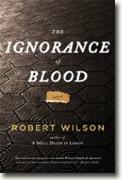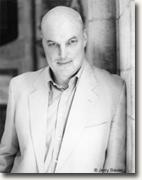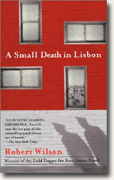author interview
book reviews:
· general fiction
· chick lit/romance
· sci-fi/fantasy
· graphic novels
· nonfiction
· audio books
· author interviews
· children's books @
curledupkids.com
· DVD reviews @
curledupdvd.com
newsletter
win books
buy online
links
home
for authors
& publishiss
for reviewers

|
|||||
 
Robert Wilson talks with contributing editor Luan Gaines about writing the final chapter on a series protagonist, blood as a motivator for revenge, and looking at the spaces between the headlines. Interviewer Luan Gaines: Had you planned The Ignorance of Blood Robert Wilson: The Falcón books were always going to be a tetralogy, that is a quartet of books held together by an enduring theme with interlocking storylines and characters, rather than a series with Falcón at the helm throwing himself into adventure after adventure. The difference being that series characters don’t change very much. Readers want to be led by a safe and unchanging pair of hands throughout. I wanted to see how a man could change. I was taking Falcón on a specific journey from one point in his life to another.
The Ignorance of Blood The point about the car crash is that it brings together two forces, one benign and unknowing and the other malign and intent. Whilst this is an obvious metaphor for fate it also struck me as the metaphor for a lot of police work. Parallel lives, which would never ordinarily meet, suddenly come together and create a violent spark. Out of this particular short circuit comes two things: the fact that one of the drivers is a known Russian gangster and in his car he has DVDs of important people indulging in compromising acts. This is interesting, but what makes it crucial to Falcón moving his investigation into the Seville bombing forward is the face of one of the unimportant people on the DVDs. (Everything is a test of one’s ability to see, in this case it’s to see the right thing rather than the obvious thing). His vast investigation has led him down many paths, most of them are dead ends, but when he gives the DVDs over to his squad to identify the ‘important people’ who’ve been filmed, one of his detectives spots the face of a girl she knows. This tiny clue leads Falcón to, what has been for him, one of the most suspicious elements of his investigation: Marisa Moreno, who was the girlfriend of the disgraced judge Esteban Calderón. This is how I believe most police work functions: vast amounts of work, huge quantities of data but only the human mind can make the crucial links. Can you explain the evolution of the Russian mafia in this part of the world? How does the excessive violence of this group change the face of crime in Seville? Andalusia, in Southern Spain, and especially its seaside resort towns along the Costa del Sol, has all the necessary elements to entice criminal gangs. In the last fifteen years it has attracted more than 100 million tourists who’ve spent nearly $70 billion. These people need to be housed and entertained. The Russian mafia can supply an endless stream of girls and now drugs. Not only that, they then have the facility to launder their money in the vast number of tourist developments along the coast. All they have to do is bribe the local town halls and start work. Of course they need to protect their turf from other gangsters, who’ve been operating there for years, and hence the need for more extreme violence. As far as I know the Russians have not moved into Seville yet. But when I was in Prague in 2002 I saw the ease with which they were operating their casinos, prostitutes and protection rackets there. Given that the two most popular destinations for stag parties in Europe are Prague in the north and Seville in the south, I don’t think it will be long before we see Russians traveling up from the Costa del Sol (where they’re already entrenched) which is only a couple of hours drive away. What is the link between Costa del Sol and Seville and why is it significant? Seville is the capital of Andalusia with the State Parliament in the city. All laws, budgets and finance emanate from here. The Costa del Sol, as you can tell from the figures I gave above, is one of Andalusia’s most important economic assets. Tourism brings in double the GDP of the rest of the region. A lot of wealthy and influential people in Seville have their summer hideaways in places like Marbella, which is the ‘Palm Beach’ of the Costa del Sol. The powerful link is money from the Costa del Sol and power from Seville. It would only be natural for Organized Crime to want to influence the source of power in the region. Inspector Jefe Javier Falcon has been one of my favorite fictional characters since The Blind Man of Seville. In this final novel, he is faced with a number of conflicts, those behind the terrorist bombing in Seville, the outrageous activities of the Russian mob, the complications of a long-standing friendship, a romantic relationship with Consuelo Jimenez and the sad fate of Jefe Esteban Calderon? As a character, has Falcon accomplished what you wanted? He has, absolutely. When we first met Falcón he was in a poor mental state. He was divorced, but not because of the usual reasons that policemen’s marriages don’t hold up. He seemed to be psychologically impaired in some way; unable to get on with members of his squad, lacking in sociability, possibly too conservative in his thinking and far too introspective for a Spaniard. But all along we felt the quality of his intelligence and we sympathized, if not empathized, with the nature of his unknown psychological problem. No reader can be impervious to the sense of the abyss awaiting Javier in The Blind Man. He falls and is broken by it. The subsequent books are all about his rebuilding. This is made possible only by his going back to the origins of his psychological trauma and confronting them. In The Vanished Hands he learns the art of communication and we see him start to employ it in his police work. In The Hidden Assassins he is at the top of his game in terms of running his squad and managing this huge and complex investigation. He is very definitely a man who is respected and has been embraced by his community. And yet there’s something missing. The emotional void left by his mother (and his part in her death) still needs to be filled and we look to Consuelo to do the job. The Ignorance of Blood
The interesting thing about these two men was that in the beginning I believed that they liked each other, that they could see themselves becoming close friends. In The Blind Man they had tremendous respect for each other and admired each other’s qualities. Calderón managed that investigation brilliantly as Falcón’s mental state deteriorated. Falcón maintained his respect and liking for Calderón even when he found out that the judge was having a relationship with his ex-wife, Inés. What happened next was one of those moments in a writer’s life when the character took over. It was at the beginning of The Vanished Hands and all the characters had just met the stunningly beautiful American photographer, Maddy Krugman. Moments later Calderón took Falcón aside and revealed to him that he was going to marry Inés. Falcón was expecting this, but it still came as an incomprehensible blow to him. At this point Calderón left Falcón and went straight across to Maddy Krugman’s house and began flirting with intent. Until that moment I did not know that Calderón was a womanizer. Only then did everything fall into place. What I hadn’t quite understood about them, until that moment, was that they were both drawn to and repelled by each other. The only reason that Calderón had started an affair with Inés was because he was fascinated by Falcón and he assumed that this man’s wife would be extraordinary. He was wrong and his fate was sealed by this gross error. However, even when Falcón realised that Calderón had been cheating on him all this time, he still couldn’t consign him to mental trash. This is the nature of those who are repelled by and drawn to each other: the one can never quite give up on the other. Falcón has no admiration for the wife-beating judge, but he can’t quite persuade himself that the man is a murderer. In The Ignorance of Blood Calderon personifies the Shakespearean theme of appearance versus reality: he is a powerful, charismatic figure accused of a heinous murder. Contrast the paths of these two men, their choices and moral complexities. How do these two characters reflect the character of their city? I think there is a powerful moment at the end of The Ignorance of Blood Calderon’s arrest for the murder of Falcon’s ex-wife has thrown the entire terrorist bombing investigation off track. Suddenly Falcon is questioning the circumstances of the murder. Why? He sees it as the one chink in an otherwise cast-iron case. His investigation into the bombing is blocked on all sides with no other leads to follow. Because he was not allowed to investigate the murder of his ex-wife, he had always thought of it as an area of weakness with potential. With the small clue he gains from the car crash at the beginning he is able to pressurise that weakness and a few more hairline cracks develop as a result. The connections he ultimately puts together lead him to the mayor’s office and corruption in high places. How does potential government corruption impact Falcon’s efforts to solve the bombing case? What are the implications of such corruption? Is it linked to the pervasive influence of the Russian mafia? While Seville appears to be a city it is in fact a large village. The people who run it all know each other. Once a threat to their number is felt they close ranks and Falcón´s job becomes much more difficult. The implication of such corruption is that the rule of law no longer applies and the rule of the jungle comes into play. The nature of the mafia is to find a weakness and exploit it. If they can’t find a weakness they create it through temptation or threat. Once Organized Crime gets a foothold then government can no longer perform in the interests of the people it represents. It’s a disastrous situation and Falcón is determined that this won’t happen in Seville. What is the status of Falcon’s relationship to Consuelo Jimenez in The Ignorance of Blood They are tentatively trying to have a relationship. There are the inevitable complications as two middle-aged people adjust their lives to accommodate each other. Consuelo has three sons, all of school age, and a demanding job running a restaurant empire. Falcón has a demanding job and he’s trying to get used to the idea of being a father, at least to the youngest boy. The heart of this book is about these two coming together in a way that enables them to be completely open with each other. It’s not easy for people at this stage of life to reveal themselves for who they are, which is, of course, crucial if you are to fall in love with someone. Both of them have had relationships and marriages which have failed and these have made them cautious and wary. The pressure is further intensified by the kidnapping of Consuelo’s youngest boy, but, paradoxically, this also gives her the opportunity to show her mettle and for Falcón to admire her utterly. Because of his work, it is impossible for Consuelo to make contact with Falcon at a critical time. Does this inability to contact Falcon impact the relationship? Consuelo is strong but she realises how much she relies on Falcón under this particular stress. She places high expectation on him and he responds in the only way he knows how: by the book. It’s what she needs at the time and she loves him for it. But is it real? He knows it’s not. She discovers what she believes is duplicity on his part. They have to find a new way of communicating with each other. So her inability to contact him does not impact the relationship, but the misunderstanding that arises from the circumstances does.
I don’t think so. He is, however, at the very height of his perceptiveness, seeing his superiors as they really are and he is not impressed. Their priority is the appearance of things. Getting it right in the press. Pulling off the PR coup. And, of course, their friends in high places. Only Falcón remembers the brutally hard work put in by his squad and he publicly praises them for it at the inevitable press conference. He is drained by the sudden end of the colossal investigation, but this does not alter who he is or how he sees things. If anything he is a stronger man, but he can’t work for his bosses any more and some of the choices he’s been forced to make have rendered his continuation in the police force questionable. In that vein, how does the globalization of crime aid the terrorists in carrying out their missions? How can law enforcement compete in such an environment? Certainly the lack of border controls once inside the European Union have made it easier for criminals and terrorists to move around. The ease with which money circulates around the world and the lack of regulation in certain countries coupled with moral slackness in certain banks have made the life of Organized Criminals a lot easier. Law enforcement has to work closely with intelligence agencies to make up for the lack of controls. How does technology impact the writing of crime fiction? Isn’t the damage human beings do to one another more visceral and powerful than the evil genius behind technology-based crimes? There’s always a place for high technology in crime fiction. However, it dates easily. What seems to be cutting edge today is old news by the time your book comes out. Whereas the human story is an endlessly fascinating subject which never seems to date. Falcon’s friendship with Yacoub Diouri is long-standing, an integral part of Falcon’s past: “Yacoub had become synonymous with the reassertion of sanity in Falcon’s mind.” Yet this relationship is vulnerable in the current situation. Without disclosing any critical plot elements, can you explain Yacoub’s importance in Falcon’s life? It goes back to the emotional void left by his dead mother and the deception of the man he thought to be his father, Francisco Falcón. After The Blind Man, Falcón, in order to win back Consuelo, sets about finding Yacoub Diouri. He was known in his previous life as Arturo, and was the son of Consuelo’s late husband, Raúl, the first murdered man of the Seville Quartet. The extraordinary nature of their past brings them together: Yacoub was born a Spaniard but brought up in Morocco by the family of the businessman who kidnapped him. Falcón discovers that he is, in fact, half Moroccan, but was brought up a Spaniard in Seville. Their experiences have given them, as it does many who have been the victims of trauma, unique insights into the ways of the world. Because they’ve revealed themselves to each other in a way that they haven’t to others, they have a unique relationship. Their persistence in always trying to see the grim reality beneath the gilded surface makes them feel like brothers. “Whatever happens, I want you to know I don’t regret any of this.” In the final pages of The Ignorance of Blood He knows it as he’s doing it. He does not go into it blindly. He makes an instant decision based on his love and admiration for Consuelo that he would do anything for her. This is the crux of the book. In the West our motivations have become more ‘personal’, even ‘sentimental’: we value our families above all else, the media constantly reminds us of ‘our loved ones’, we cry for unknown celebrities. Less and less do we get excited about politics, intellectual thought or religion. The idea of laying down our lives for these nebulous entities now seems ridiculous. All that has come to us so easily such as democracy, freedom of the press, women’s liberation, is taken for granted. However in certain parts of the Muslim world where religion, philosophy and politics are the same thing (the Koran) it is the prime motivator. Martyrs for the cause abound. Theirs is an unyielding world (one with fundamentalist beliefs) coming up against a hard world (one with military might and financial depth) which also has a soft centre. Because of Falcón’s particular past he has decided to place a premium on the person who makes him feel whole, even though it means he will have to transgress some of his moral boundaries. Yacoub makes the same decision, but, and this is his particular tragedy, he is closer to the hard surface of fundamentalism. How did writing the final chapter in Falcon’s story affect you? Are you ready to let him go? What has been the most difficult part of creating this character? The most rewarding? It was not hard to let him go because I left him in a better state than when I found him. He is a stronger, more complete human being. So I was quite happy about him, although I did feel drained by the finishing of such a mammoth 7-year writing project. The difficulty is to move on to the next thing after such a long and involving commitment. The trickiest aspect of the creation of Javier Falcón was to make the reader persevere with the character and believe in his essential qualities when, initially anyway (because of his impending break down), he is not a particularly attractive man. The most rewarding was to find a believable way of bringing Javier and Consuelo together. Besides Inspector Jefe Javier Falcon, who have been the most demanding and interesting characters in this series (The Blind Man of Seville, The Vanished Hands, The Hidden Assassins, The Ignorance of Blood Javier’s father, Francisco Falcón, was a fascinating character and to have developed him through his journals was one of my most exciting creative experiences of writing the Seville Quartet. When Consuelo and Javier first met in The Blind Man, he as the Inspector and she as the prime suspect, it transformed my understanding of what I was trying to do with them and that was also a powerful creative moment. As I mentioned above, it was great to witness Calderón’s transformation into a womaniser. I also felt very close to the Spanish actor in The Vanished Hands, Pablo Ortega, who was a character with whom I had enormous sympathy. I enjoyed the way Ramírez was transformed from a difficult member of Falcón’s squad into his staunchest supporter. I also enjoyed creating that very special relationship between Cristina Ferrera, the ‘little nun’, and Javier. To see Marisa change from being a very unattractive personality in The Hidden Assassins to someone who is deserving of our sympathy was very rewarding. I always wanted a bigger part in The Ignorance of Blood
Writing this sort of fiction, I think, demands that you keep abreast of what is happening in the world. My wife and I are current affairs addicts and we’re always looking at the spaces between the headlines to try to work out what is really meant. I find analysis of what is not being said more interesting than that of what is being revealed or, as in most news reports, speculated upon. I like the idea of there being a bigger picture out there. I am never going to be one for the parochial crime novel. The market has also changed in the last few years, with the advent of electronic reading devices (Kindle) and a tightened economy. How have these changes impacted you as a writer? Are you writing for a different audience now? Do you have any opinions on these changes? Once you start writing for an audience you are finished because it means you will always be chasing the market rather than being its leader. Having said that when I declared an interest in writing about China there was palpable and collective dismay amongst my editors, agent, friends and fellow writers. There seems to be this deep lack of interest in China, yes, almost antagonistic. It seems that the West isn’t ready for crime fiction about China. I think this is because we’re scared of it. China has become the future. When it was a basket case China was interesting. We couldn’t get enough of the madness and horror of the Cultural Revolution. But now that it appears that the Chinese economy will become the biggest in the world by 2020, they have become a massive and unknown quantity to be feared and preferably ignored. I think we still fall into the cultural stereotypical trap of the ‘inscrutable Chinaman’, which turns off our interest in the nature of their character. I’ve also noticed more and more that readers in the West struggle with names and concepts outside their comfort zones. As the world has become more global in its reach so the West has become more insular. I think we’re becoming more inward looking. It could be the sign of a power falling in on itself…which is an interesting subject, too.
I don’t like saying goodbye to my favorite characters - or to books as I have always enjoyed them, printed, tactile, a faint smell of fresh ink. However I will accept that Javier Falcon’s story is finished. That said, have you given any thought to resurrecting Bruce Medway and his West African adventures? Or it there a new character on the horizon? I have no thoughts of resurrecting Bruce Medway. I am currently working on a novel set in London. Robert Wilson is the author of nine previous novels. A graduate of Oxford University, he has worked in shipping, advertising, and trading in Africa, and has lived in Greece and West Africa. Contributing editor Luan Gaines interviewed author Robert Wilson, author of The Ignorance of Blood (see accompanying review), about his book for curledup.com. Luan Gaines/2009.
|
|||||
| fictionnsf/f · comic books · nonfiction · audio newsletter · free book contest · buy books online review index · links · · authors & publishiss reviewerss |
|
| site by ELBO Computing Resources, Inc. | |



